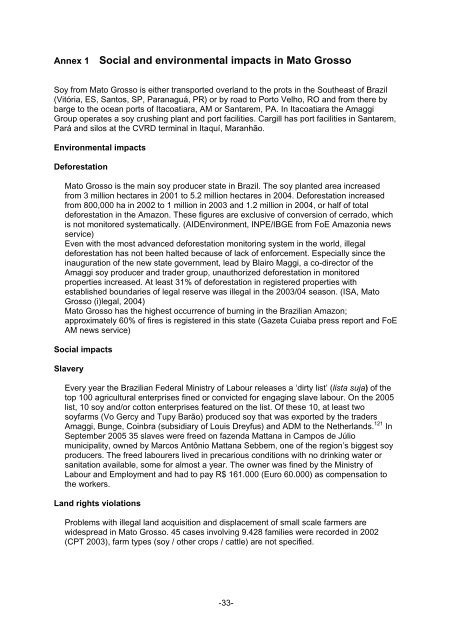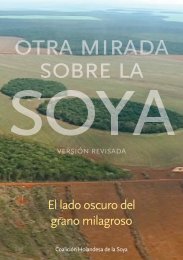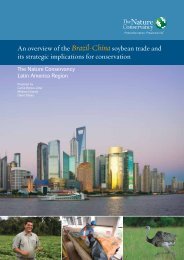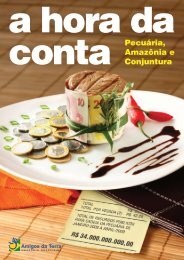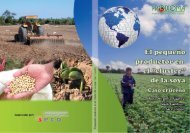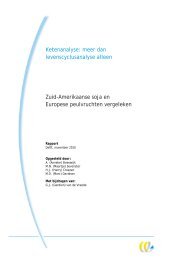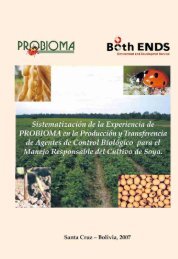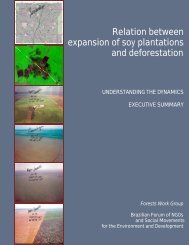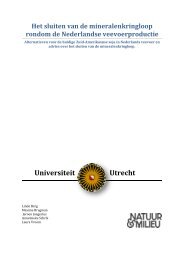VAN OERWOUD TOT KIPPENBOUT
VAN OERWOUD TOT KIPPENBOUT
VAN OERWOUD TOT KIPPENBOUT
- No tags were found...
Create successful ePaper yourself
Turn your PDF publications into a flip-book with our unique Google optimized e-Paper software.
Annex 1Social and environmental impacts in Mato GrossoSoy from Mato Grosso is either transported overland to the prots in the Southeast of Brazil(Vitória, ES, Santos, SP, Paranaguá, PR) or by road to Porto Velho, RO and from there bybarge to the ocean ports of Itacoatiara, AM or Santarem, PA. In Itacoatiara the AmaggiGroup operates a soy crushing plant and port facilities. Cargill has port facilities in Santarem,Pará and silos at the CVRD terminal in Itaquí, Maranhão.Environmental impactsDeforestationMato Grosso is the main soy producer state in Brazil. The soy planted area increasedfrom 3 million hectares in 2001 to 5.2 million hectares in 2004. Deforestation increasedfrom 800,000 ha in 2002 to 1 million in 2003 and 1.2 million in 2004, or half of totaldeforestation in the Amazon. These figures are exclusive of conversion of cerrado, whichis not monitored systematically. (AIDEnvironment, INPE/IBGE from FoE Amazonia newsservice)Even with the most advanced deforestation monitoring system in the world, illegaldeforestation has not been halted because of lack of enforcement. Especially since theinauguration of the new state government, lead by Blairo Maggi, a co-director of theAmaggi soy producer and trader group, unauthorized deforestation in monitoredproperties increased. At least 31% of deforestation in registered properties withestablished boundaries of legal reserve was illegal in the 2003/04 season. (ISA, MatoGrosso (i)legal, 2004)Mato Grosso has the highest occurrence of burning in the Brazilian Amazon;approximately 60% of fires is registered in this state (Gazeta Cuiaba press report and FoEAM news service)Social impactsSlaveryEvery year the Brazilian Federal Ministry of Labour releases a ‘dirty list’ (lista suja) of thetop 100 agricultural enterprises fined or convicted for engaging slave labour. On the 2005list, 10 soy and/or cotton enterprises featured on the list. Of these 10, at least twosoyfarms (Vo Gercy and Tupy Barão) produced soy that was exported by the tradersAmaggi, Bunge, Coinbra (subsidiary of Louis Dreyfus) and ADM to the Netherlands. 121 InSeptember 2005 35 slaves were freed on fazenda Mattana in Campos de Júliomunicipality, owned by Marcos Antônio Mattana Sebbem, one of the region’s biggest soyproducers. The freed labourers lived in precarious conditions with no drinking water orsanitation available, some for almost a year. The owner was fined by the Ministry ofLabour and Employment and had to pay R$ 161.000 (Euro 60.000) as compensation tothe workers.Land rights violationsProblems with illegal land acquisition and displacement of small scale farmers arewidespread in Mato Grosso. 45 cases involving 9.428 families were recorded in 2002(CPT 2003), farm types (soy / other crops / cattle) are not specified.-33-


